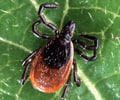Up to 450,000 Americans may have been impacted by a potentially fatal red meat allergy induced by ticks, with many doctors unsure of what it is or how to treat it.
- A recent study shows how tick bites can cause severe meat allergies in a considerably higher percentage of Americans than previously thought, possibly affecting half a million Americans
- Alpha-gal syndrome (AGS), the tick-borne meat allergy, remains unfamiliar to many doctors, leading to challenges in diagnosis and treatment
- AGS is triggered by alpha-gal, a sugar found in various meats and gelatin products, as well as cow's milk, milk products, and certain medications
Nearly a Half-Million Americans Could Have Tick-Borne Meat Allergy Syndrome
According to one of two studies published in the Morbidity and Mortality Weekly Report by experts at the Centers for Disease Control and Prevention, there were more than 110,000 probable instances of alpha-gal syndrome identified between 2010 and 2022. However, because a diagnostic test and a clinical exam are required for diagnosis, many patients may not get examined. Based on this, the CDC researchers predicted that up to 450,000 Americans may be impacted (1✔ ✔Trusted SourceHealth Care Provider Knowledge Regarding Alpha-gal Syndrome — United States, March-May 2022
Go to source).
Researchers examined lab findings from 2017 to 2022 from a facility that was the sole commercial lab performing such testing in the United States until August 2021.
More than 300,000 samples were analyzed, and more than 30% of them tested positive for AGS.
Alpha-Gal Syndrome: A Ticking Public Health Problem
"Alpha-gal syndrome is an important emerging public health problem, with potentially severe health impacts that can last a lifetime for some patients," CDC researcher Dr. Ann Carpenter said in an agency news release."It's critical for clinicians to be aware of AGS so they can properly evaluate, diagnose and manage their patients, and also educate them on tick bite prevention to protect patients from developing this allergic condition."
Unfortunately, a second study conducted by the same CDC researchers discovered that many health care practitioners are unfamiliar with the potentially fatal allergy illness, according to the agency.
According to a survey of 1,500 family doctors, internists, pediatricians, nurse practitioners, and physician assistants, nearly half (42%) had never heard of AGS, one-third were "not too confident" in their ability to diagnose or manage patients with the syndrome, and only 5% were "very confident" (2✔ ✔Trusted Source
Geographic Distribution of Suspected Alpha-gal Syndrome Cases — United States, January 2017-December 2022
Go to source).
What is Alpha-Gal Syndrome?
Alpha-gal is a sugar present in meats such as pig, cattle, rabbit, lamb, and venison, as well as gelatin products, cow's milk, milk products, and various medications. AGS is a severe allergic reaction that some people experience after consuming alpha-gal-containing foods or goods.Evidence shows that AGS is caused by a lone star tick bite, but other forms of ticks have not been ruled out, according to the researchers.
According to the CDC, more persons have tested positive for AGS in the Southern, Midwestern, and Mid-Atlantic areas.
Why is Diagnosing Alpha-Gal Syndrome so Hard?
"The burden of alpha-gal syndrome in the United States could be substantial, given the large percentage of cases suspected to be going undiagnosed due to non-specific and inconsistent symptoms, challenges seeking health care, and lack of clinician awareness," said CDC researcher Dr. Johanna Salzer, the senior author on both studies."It's important that people who think they may suffer from AGS see their health care provider or an allergist, provide a detailed history of symptoms, get a physical examination, and a blood test that looks for specific antibodies [proteins made by your immune system] to alpha-gal," she said in the release.
What are the Symptoms of Alpha-Gal Syndrome?
Here are the symptoms of AGS you need to look out for:- Hives or itchy rash
- Nausea or vomiting
- Heartburn or indigestion
- Diarrhea
- Cough
- Shortness of breath or difficulty breathing
- Drop in blood pressure
- Swelling of the lips, throat, tongue, or eyelids
- Dizziness or faintness
- Severe stomach pain
References:
- Health Care Provider Knowledge Regarding Alpha-gal Syndrome — United States, March–May 2022 - (https://www.cdc.gov/mmwr/volumes/72/wr/mm7230a1.htm)
- Geographic Distribution of Suspected Alpha-gal Syndrome Cases — United States, January 2017–December 2022 - (https://www.cdc.gov/mmwr/volumes/72/wr/mm7230a2.htm)
Source-Medindia
















